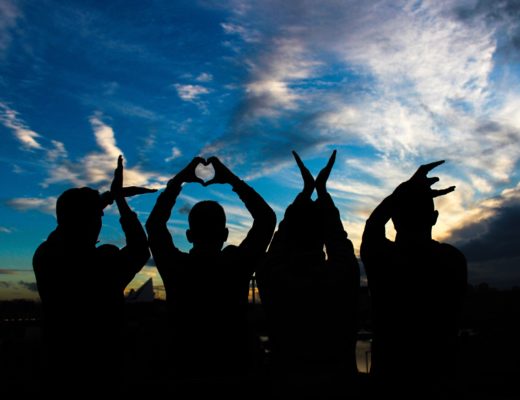I’ve decided to start a monthly series on musings I have on various mental health topics. It could be anything from an issue that I’m struggling with during that week, through to something new that I’m trying out (like a mindfulness app or a book that I’ve read). This month, I’m wrestling with decision making…
Is it just me, or does decision making become more difficult with age?
I’ve never taken big decisions lightly. I’m the kind of person who likes to have time to weigh up the options, make a plan, and then take the plunge. That doesn’t mean I’m risk averse; I’ve taken quite a few less-than-conventional routes during my adult life to know that when I make my mind up about something, I’ll go for it, even if I can’t quite see where that road will ultimately lead me. But I’m finding that as I meander my way into my late 30s that making a potentially life-changing decision is way more difficult than it used to be.
Whereas in my 20s, whether I realised it or not, I felt like I had my whole life stretching ahead of me (i.e. room to make mistakes), I now feel like every decision I make will make a big difference to the situation I’ll find myself in when I get old. And this way of thinking is making the whole decision-making process oh so more difficult.
All of a sudden, it feels like every single life-related decision really matters.
This conundrum means that as I find myself at another major crossroad in my life that I’m flipping back and forth between two options like a pendulum on speed. Option one is what I’d call the ‘safe’ option – the path of least resistance, the one with a more predictable outcome, while option two will take me way outside of my comfort zone, see me pursuing my dreams, and propel me on a journey that I cannot predict. My head tells me one thing, but my instinct is telling me another (I’ll let you guess which option my instinct is gunning for).
This decision making been going on for months, and I have to say I’m now exhausted (and bored of myself).
It got me wondering about what research can tell us about how to make better decisions – and it turns out, plenty. For example, if you want to make more rational decisions it’s suggested that you should remove yourself from the situation and think of yourself as an observer instead. A study in the journal Psychological Science found that when you think about a relationship problem from a first-person perspective, you’re less likely to use wise reasoning. If you distance yourself from the problem by approaching it as an outsider, however, you’re more likely to utilise wise reasoning strategies, such as thinking of others’ perspectives and of different ways the scenario could unfold.
Then there’s research by the American Psychological Association that suggests those who make decisions based on their gut feelings are more likely to stick with them. The researchers of the study concluded that intuitive, feelings-based decisions give us a sense of conviction that deliberative decisions don’t. And maybe that’s because when we use our gut feelings to process a decision, we’re making a choice on the basis of how we feel about the options rather than what we think of them. So, in short, making decisions based on our intuition can be better than trying to be logical about it.
I am totally on board with both of these ways of making a decision. For one, I’ve always believed that I have a very strong intuition and the only time I get things wrong is when I go against what it’s trying to tell me. I also always try to take a step back from any problem that I have and to give myself the advice I’d give to a friend.
But the problem with making life-changing decisions is that even though we can weigh up the pros and cons of any given trajectory and we can sit and analyse the likely outcomes of each, we cannot predict how things will unfold. We also cannot predict how we’re going to feel about things in the future. For example, even if, let’s say, I make one decision right now on the basis that I believe it will make me happy three years down the line, I cannot know for sure that will actually be the case once I reach my objective. Maybe I’ll go for it and find it’s not for me; we can never know for sure how we’ll feel until we’ve lived through something.
I’ve utilised both of the aformentioned methods with my current dilemma. I’ve pretended that the decision I need to make is actually a close friend’s and it’s clear that I’d tell him or her that they should follow their heart and pursue their dreams (as long as they have a vague plan in place – I’m all about planning!). I’ve also thought about how each decision makes me feel; sticking with ‘safe’ option one makes me feel trapped, despondent and disappointed, whereas going with option two makes me feel alive, proud, excited and nervous. My instinct, in case you haven’t already guessed, is telling me to ditch the safe option and send my heinie on another adventure.
When I look at it like that, it seems so easy. In fact, I’m sure all of you are reading this thinking “WHERE’S THE DILEMMA HERE, WOMAN? Go for it!” And that’s when I return to my initial point: decision making in my late 30s feels more difficult than it was in my 20s. And it’s always easier to be objective about a decision when it’s not our own.
On the afternoon that I wrote most of this blog post, I found myself daydreaming of what the potential outcomes could be if I take option number two. And it made me realise that whereas option one is safe, safe isn’t pushing me to learn anything. Safe is where one stagnates. Safe may feel comfortable for a while, but eventually it can start to feel suffocating. I can’t daydream about where option one will take me because I already know – I’m living it. You can’t daydream about a future that looks a lot like the present.
But when I daydream about option two, I see growth, I see dreams coming true, I see new horizons, I see myself living life instead of merely existing and wishing the days away. I see adventure, creativity and personal growth, which are three of my values, and research shows that living in line with our values is good for us.
So, perhaps that’s the (very unscientific) answer. Daydream about the potential outcomes of all your options and see how they make you feel. And if you still cannot find the answer, flip a coin and hope that the answer you know deep down is the one you want is the one it falls on.
How do you make difficult life decisions?
Further reading:
https://www.newyorker.com/magazine/2019/01/21/the-art-of-decision-making
https://www.lifehack.org/565081/10-best-ted-talks-that-make-choosing-easy-any-time




